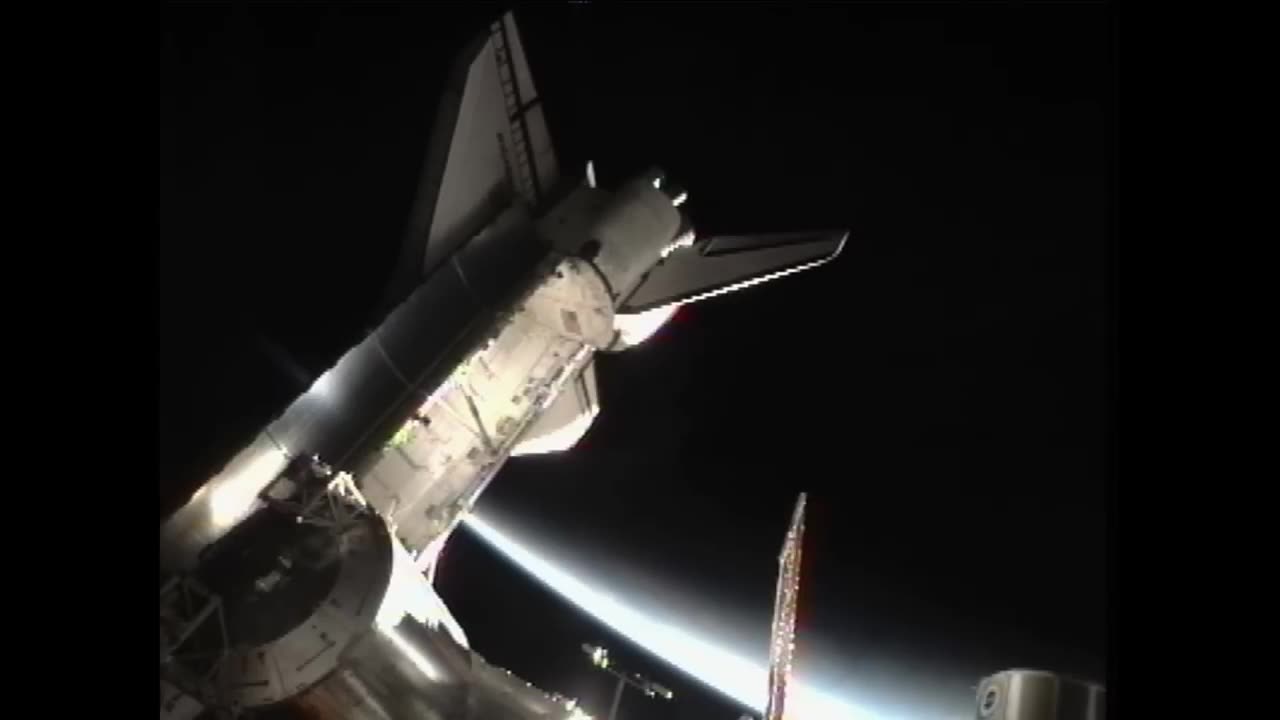Premium Only Content

Soyuz Undocks from ISS
NASA's mission is to pioneer the future in space exploration, scientific discovery and aeronautics research. To do that, we have worked around the world -- and off it -- for more than 50 years, searching for answers to fundamental questions about our place in the universe. We're exploring space and discovering Earth. Join us for this exciting and important journey.
#NASA
#Space
#Astronomy
#Science
#SpaceExploration
#RocketLaunch
#Cosmos
#Astrophysics
#SpaceMissions
#PlanetaryScience
#SpaceTech
#SpaceDiscovery
#Exoplanets
#InternationalSpaceStation
#Stargazing
#Galaxies
#Universe
#SpaceResearch
#SolarSystem
#BlackHoles
#MoonLanding
#MarsExploration
#Satellites
#StarFormation
#SpacePhotography
#AlienLife
#SpaceInnovation
#RocketScience
#CelestialBodies
#Interstellar
#OrbitalScience
#SpaceTechnology
#SpaceWeather
#NASAImages
#CosmicWonders
#AstronomyFacts
#ExploringSpace
#BeyondEarth
#GalacticExploration
#DeepSpace
#SpaceEducation
#AstronomicalDiscoveries
#CosmicJourney
#Astrobiology
#MeteorShowers
#SpaceX
#Astrochemistry
#HubbleTelescope
#SpaceAdventures
#CosmicWonders
#Space
#NASA
#Astronomy
#Science
#SpaceExploration
#RocketLaunch
#Astrophysics
#SpaceMissions
#PlanetaryScience
#SpaceTech
#Galaxies
#Stargazing
#Universe
#Cosmos
#BlackHoles
#SolarSystem
#MoonLanding
#MarsExploration
#InternationalSpaceStation
#Satellites
#AlienLife
#SpacePhotography
#StarFormation
#SpaceResearch
#OrbitalScience
#SpaceInnovation
#CelestialBodies
#Interstellar
#Astrobiology
#MeteorShowers
#SpaceX
#HubbleTelescope
#SpaceAdventures
#AstronomyFacts
#DeepSpace
#Extraterrestrial
#GalacticExploration
#SpaceTravel
#AstronomyClub
#CosmicWonders
#ExploringSpace
#SpaceEducation
#AstronomyPhotos
#BeyondEarth
#CosmicJourney
#SpaceObservation
#Astrochemistry
#SpaceWeather
#CosmicCuriosity
#SpaceCommunity
The National Aeronautics and Space Administration is America’s civil space program and the global leader in space exploration. The agency has a diverse workforce of just under 18,000 civil servants, and works with many more U.S. contractors, academia, and international and commercial partners to explore, discover, and expand knowledge for the benefit of humanity. With an annual budget of $23.2 billion in Fiscal Year 2021, which is less than 0.5% of the overall U.S. federal budget, NASA supports more than 312,000 jobs across the United States, generating more than $64.3 billion in total economic output (Fiscal Year 2019).
At its 20 centers and facilities across the country – and the only National Laboratory in space – NASA studies Earth, including its climate, our Sun, and our solar system and beyond. We conduct research, testing, and development to advance aeronautics, including electric propulsion and supersonic flight. We develop and fund space technologies that will enable future exploration and benefit life on Earth.
NASA also leads a Moon to Mars exploration approach, which includes working with U.S. industry, international partners, and academia to develop new technology, and send science research and soon humans to explore the Moon on Artemis missions that will help prepare for human exploration of the Red Planet. In addition to those major missions, the agency shares what it learns so that its information can make life better for people worldwide. For example, companies use NASA discoveries and technologies to create new products for the public. To ensure future success for the agency and the nation, NASA also supports education efforts in STEM with an emphasis on increasing diversity in our future workforce.
The term "astronaut" derives from the Greek words meaning "space sailor," and refers to all who have been launched as crew members aboard NASA spacecraft bound for orbit and beyond. The term "astronaut" has been maintained as the title for those selected to join the NASA corps of astronauts who make "space sailing" their career profession.
Active Astronauts: Eligible for flight assignment.
Management Astronauts: Currently employed at NASA but are no longer eligible for flight assignment.
Astronaut Candidates: Selected by NASA as candidates for the NASA astronaut corps.
Former Astronauts: Astronauts are those who have left NASA, including those who are deceased.
International Astronauts: Astronauts from international space agencies who have trained or served with NASA Astronauts.
Greetings! Thank you for your interest in a NASA exhibit and artifact. Due to the high demand, unfortunately at this time, NASA is unable to accommodate requests for exhibits and artifacts. NASA is taking steps to improve our process for borrowing artifacts and exhibits in order to better serve the numerous requests received. In the meantime, we encourage you to use NASA's many online resources. Please continue to follow our website for updates.
Speakers Bureau: https://www.nasa.gov/about/speakers/nasa-speakers-howto.html
Solar System Ambassadors: https://solarsystem.nasa.gov/solar-system-ambassadors/events/
NASA @ Home: https://www.nasa.gov/specials/nasaathome/index.html
Astronaut Appearances: https://astronautappearances.nasa.gov/
STEM Engagement: https://www.nasa.gov/stem
Virtual Guest Program NASA Virtual Guest Ops
"Asteroid City" cast asking NASA about the OSIRIS-REx asteroid mission. OSIRIS-REx is a NASA spacecraft mission designed to study and collect samples from the near-Earth asteroid Bennu. However.
As of my last update in September 2021, NASA has been studying the possibility of mining asteroids for resources, particularly valuable minerals and metals that could be used for space exploration and even back on Earth. This concept is often referred to as asteroid mining.
One of the key missions related to asteroid mining was the OSIRIS-REx mission, which stands for Origins, Spectral Interpretation, Resource Identification, Security, Regolith Explorer. OSIRIS-REx was designed to study the near-Earth asteroid Bennu and collect a sample from its surface. While the primary goal of OSIRIS-REx was to better understand the origins of our solar system and the role of asteroids in that process, the mission also carried implications for future asteroid mining.
Asteroids are rich in various resources, including precious metals, water ice, and other minerals. These resources could potentially be used to support future space exploration missions by providing raw materials for spacecraft construction, fuel production, and life support systems.
NASA's interest in asteroid mining is part of a broader effort to develop sustainable space exploration and utilization strategies. The agency, along with private companies in the space industry, has been exploring the technical, economic, and ethical aspects of mining asteroids.
Since my information is not up-to-date, I recommend checking the latest news and updates from NASA or reputable space-related sources for any recent developments in asteroid mining or related missions.
-
 23:01
23:01
Mrgunsngear
1 day ago $4.23 earnedWolfpack Armory AW15 MK5 AR-15 Review 🇺🇸
64.9K12 -
 25:59
25:59
TampaAerialMedia
1 day ago $2.01 earnedUpdate ANNA MARIA ISLAND 2025
38.3K3 -
 59:31
59:31
Squaring The Circle, A Randall Carlson Podcast
12 hours ago#039: How Politics & War, Art & Science Shape Our World; A Cultural Commentary From Randall Carlson
29.9K2 -
 13:21
13:21
Misha Petrov
12 hours agoThe CRINGIEST Thing I Have Ever Seen…
23.8K48 -
 11:45
11:45
BIG NEM
8 hours agoWe Blind Taste Tested the Best Jollof in Toronto 🇳🇬🇬🇭
16K -
 15:40
15:40
Fit'n Fire
12 hours ago $0.32 earnedArsenal SLR106f & LiteRaider AK Handguard from 1791 Industries
14K1 -
 8:34
8:34
Mike Rowe
6 days agoWhat You Didn't Hear At Pete's Confirmation Hearing | The Way I Heard It with Mike Rowe
51.6K23 -
 7:13:44
7:13:44
TonYGaMinG
13 hours ago🟢LATEST! KINGDOM COME DELIVERANCE 2 / NEW EMOTES / BLERPS #RumbleGaming
72.5K4 -
 40:17
40:17
SLS - Street League Skateboarding
4 days agoEVERY 9 CLUB IN FLORIDA! Looking back at SLS Jacksonville 2021 & 2022 - Yuto, Jagger, Sora & more...
113K1 -
 2:00:47
2:00:47
PaddysParlorGames
22 hours agoSunday Parlor Chill: GOBSTEIN
71.1K5